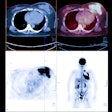Manufacturers must prove that molecular breast imaging (MBI) is a cost-effective adjunct to mammography if the breast cancer detection technology is to succeed, according to a new report from research and consulting firm GlobalData.
The report cited recent Mayo Clinic research that indicated an MBI exam with a mammogram detected an additional 8.8 cancers per 1,000 women with dense breasts. The Mayo Clinic researchers concluded that the combination of mammography and MBI increased the overall sensitivity of breast screening to 91% and specificity to 83%.
The results put MBI at the top of breast cancer imaging adjunctive techniques, which also include breast ultrasound and MRI, according to GlobalData.
Such new clinical evidence makes MBI a promising additional tool for radiologists, as it addresses an unmet need for better detection methods for women with dense breast tissue. However, while these clinical improvements create a strong case for the technology, budgetary concerns could be a large obstacle to its adoption, the firm said.




















